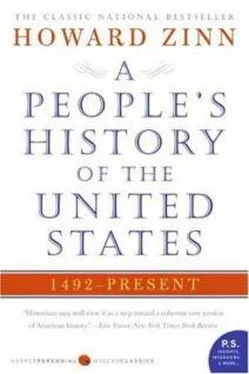Howard Zinn - A People
Здесь есть возможность читать онлайн «Howard Zinn - A People» весь текст электронной книги совершенно бесплатно (целиком полную версию без сокращений). В некоторых случаях можно слушать аудио, скачать через торрент в формате fb2 и присутствует краткое содержание. Издательство: Harper-Collins, Жанр: Фэнтези, на английском языке. Описание произведения, (предисловие) а так же отзывы посетителей доступны на портале библиотеки ЛибКат.
- Название:A People
- Автор:
- Издательство:Harper-Collins
- Жанр:
- Год:неизвестен
- ISBN:нет данных
- Рейтинг книги:4 / 5. Голосов: 1
-
Избранное:Добавить в избранное
- Отзывы:
-
Ваша оценка:
- 80
- 1
- 2
- 3
- 4
- 5
A People: краткое содержание, описание и аннотация
Предлагаем к чтению аннотацию, описание, краткое содержание или предисловие (зависит от того, что написал сам автор книги «A People»). Если вы не нашли необходимую информацию о книге — напишите в комментариях, мы постараемся отыскать её.
A People — читать онлайн бесплатно полную книгу (весь текст) целиком
Ниже представлен текст книги, разбитый по страницам. Система сохранения места последней прочитанной страницы, позволяет с удобством читать онлайн бесплатно книгу «A People», без необходимости каждый раз заново искать на чём Вы остановились. Поставьте закладку, и сможете в любой момент перейти на страницу, на которой закончили чтение.
Интервал:
Закладка:
The Reagan administration, which did not appear at all offended by military juntas governing in Latin America (Guatemala, El Salvador, Chile) if they were «friendly» to the United States, became very upset when a tyranny was hostile, as was the government of Muammar Khadafi in Libya. In 1986, when unknown terrorists bombed a discotheque in West Berlin, killing a U.S. serviceman, the White House immediately decided to retaliate. Khadafi was probably responsible for various acts of terrorism over the years, but there was no real evidence that in this case he was to blame.
Reagan was determined to make a point. Planes were sent over the capital city of Tripoli with specific instructions to aim at Khadafi's house. The bombs fell on a crowded city; perhaps a hundred people were killed, it was estimated by foreign diplomats in Tripoli. Khadafi was not injured, but an adopted daughter of his was killed.
Professor Stephen Shalom, analyzing this incident, writes ( Imperial Alibis ): "If terrorism is defined as politically motivated violence perpetrated against non-combatant targets, then one of the most serious incidents of international terrorism of the year was precisely this U.S. raid on Libya."
Early in the presidency of George Bush, there came the most dramatic developments on the international scene since the end of World War II. In the year 1989, with a dynamic new leader, Mikhail Gorbachev, at the head of the Soviet Union, the long suppressed dissatisfaction with "dictatorships of the proletariat" which had turned out to be dictatorships over the proletariat erupted all through the Soviet bloc.
There were mass demonstrations in the Soviet Union and in the countries of Eastern Europe which had been long dominated by the Soviet Union. East Germany agreed to unite with West Germany, and the wall separating East Berlin from West Berlin, long a symbol of the tight control of its citizens by East Germany, was dismantled in the presence of wildly exultant citizens of both Germanies. In Czechoslovakia, a new non-Communist government came into being, headed by a playwright and former imprisoned dissident named Vaclav Havel. In Poland, Bulgaria, Hungary, a new leadership emerged, promising freedom and democracy. And remarkably, all this took place without civil war, in response to overwhelming popular demand.
In the United States, the Republican party claimed that the hard-line policies of Reagan and the increase in military expenditures had brought down the Soviet Union. But the change had begun much earlier, after the death of Stalin in 1953, and especially with the leadership of Nikita Khrushchev. A remarkably open discussion had been initiated.
But the continued hard line of the United States became an obstacle to further liberalization, according to former ambassador to the Soviet Union George Kennan, who wrote that "the general effect of cold war extremism was to delay rather than hasten the great change that overtook the Soviet Union by the end of the 1980s." While the press and politicians in the United States exulted over the collapse of the Soviet Union, Kennan pointed out that, not only did American policies delay this collapse, but these cold war policies were carried on at a frightful cost to the American people:
We paid with forty years of enormous and otherwise unnecessary military expenditures. We paid through the cultivation of nuclear weaponry to the point where the vast and useless nuclear arsenal had become (and remains today) a danger to the very environment of the planet.…
The sudden collapse of the Soviet Union left the political leadership of the United States unprepared. Military interventions had been undertaken in Korea and Vietnam with enormous loss of life, also in Cuba and the Dominican Republic, and huge amounts of military aid had been given all over the world-in Europe, Africa, Latin America, the Middle East, Asia-on the supposition that this was necessary to deal with a Communist menace emanating from the Soviet Union. Several trillion dollars had been taken from American citizens in the form of taxes to maintain a huge nuclear and nonnuclear arsenal and military bases all over the world-all primarily justified by the "Soviet threat."
Here then was an opportunity for the United States to reconstruct its foreign policy, and to free hundreds of billions of dollars a year from the budget to be used for constructive, healthy projects.
But this did not happen. Along with the exultation "We have won the cold war" came a kind of panic: "What can we do to maintain our military establishment?"
It became clearer now, although it had been suspected, that United States foreign policy was not simply based on the existence of the Soviet Union, but was motivated by fear of revolution in various parts of the world. The radical social critic Noam Chomsky had long maintained that "the appeal to security was largely fraudulent, the Cold War framework having been employed as a device to justify the suppression of independent nationalism-whether in Europe, Japan, or the Third World" ( World Orders Old and New ).
The fear of "independent nationalism" was that this would jeopardize powerful American economic interests. Revolutions in Nicaragua or Cuba or El Salvador or Chile were threats to United Fruit, Anaconda Copper, International Telephone and Telegraph, and others. Thus, foreign interventions presented to the public as "in the national interest" were really undertaken for special interests, for which the American people were asked to sacrifice their sons and their tax dollars.
The CIA now had to prove it was still needed. The New York Times (February 4, 1992) declared that "in a world where the postwar enemy has ceased to exist, the C.I.A. and its handful of sister agencies, with their billion-dollar satellites and mountains of classified documents, must somehow remain relevant in the minds of Americans."
The military budget remained huge. The cold war budget of $300 billion was reduced by 7 percent to $280 billion. The Chairman of the Joint Chiefs of Staff, Colin Powell, said: "I want to scare the hell out of the rest of the world. I don't say that in a bellicose way."
As if to prove that the gigantic military establishment was still necessary, the Bush administration, in its four-year term, launched two wars: a «small» one against Panama and a massive one against Iraq.
Coming into office in 1989, George Bush was embarrassed by the new defiant posture of Panama 's dictator, General Manuel Noriega. Noriega's regime was corrupt, brutal, authoritarian, but President Reagan and Vice-President Bush had overlooked this because Noriega was useful to the United States. He cooperated with the CIA in many ways, such as offering Panama as a base for contra operations against the Sandinista government of Nicaragua and meeting with Colonel Oliver North to discuss sabotage targets in Nicaragua. When he was director of the CIA in 1976–1977, Bush had protected Noriega.
But by 1987 Noriega's usefulness was over, his activities in the drug trade were in the open, and he became a convenient target for an administration which wanted to prove that the United States, apparently unable to destroy the Castro regime or the Sandinistas or the revolutionary movement in El Salvador, was still a power in the Caribbean.
Claiming that it wanted to bring Noriega to trial as a drug trafficker (he had been indicted in Florida on that charge) and also that it needed to protect U.S. citizens (a military man and his wife had been threatened by Panamanian soldiers), the United States invaded Panama in December 1989, with 26,000 troops.
It was a quick victory. Noriega was captured and brought to Florida to stand trial (where he was subsequently found guilty and sent to prison). But in the invasion, neighborhoods in Panama City were bombarded and hundreds, perhaps thousands of civilians were killed. It was estimated that 14,000 were homeless. Writer Mark Hertsgaard noted that even if the official Pentagon figure of several hundred civilian casualties was correct, this meant that in Panama the U.S. had killed as many people as did the Chinese government in its notorious attack on student demonstrators at Tiananmen Square in Beijing six months earlier. A new president friendly to the United States was installed in Panama, but poverty and unemployment remained, and in 1992 the New York Times reported that the invasion and removal of Noriega "failed to stanch the flow of illicit narcotics through Panama."
Читать дальшеИнтервал:
Закладка:
Похожие книги на «A People»
Представляем Вашему вниманию похожие книги на «A People» списком для выбора. Мы отобрали схожую по названию и смыслу литературу в надежде предоставить читателям больше вариантов отыскать новые, интересные, ещё непрочитанные произведения.
Обсуждение, отзывы о книге «A People» и просто собственные мнения читателей. Оставьте ваши комментарии, напишите, что Вы думаете о произведении, его смысле или главных героях. Укажите что конкретно понравилось, а что нет, и почему Вы так считаете.












